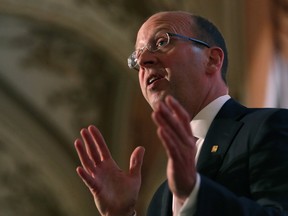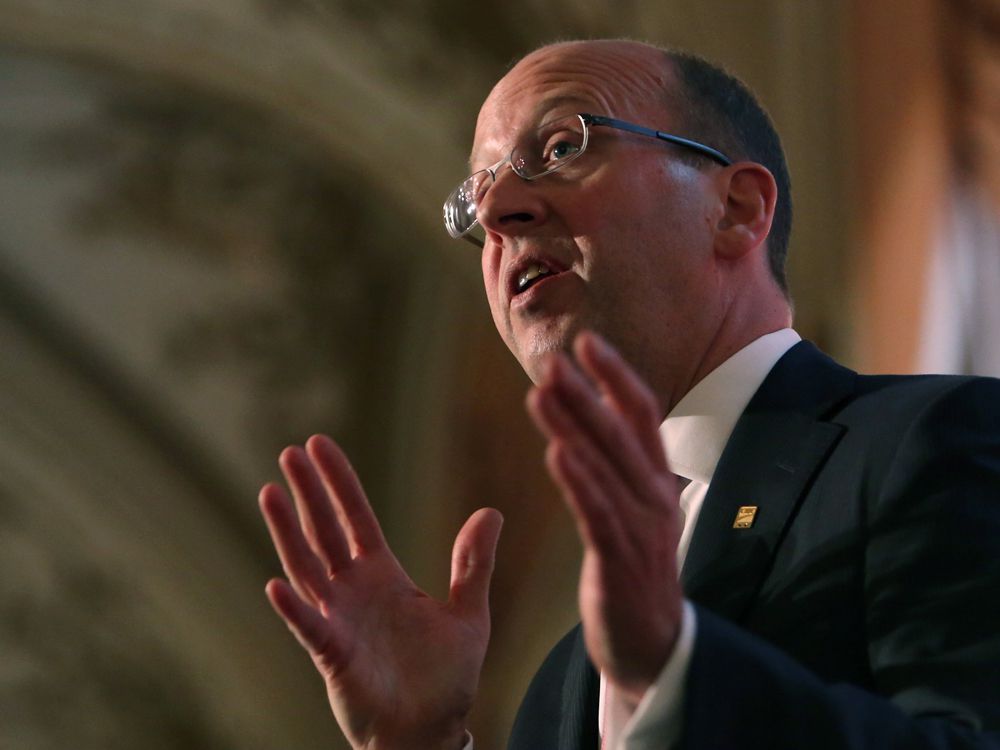Alliances are back in vogue and protectionism set aside in Ukraine war

Article content
The leaders of Canada’s biggest corporations tend to address the masses through anodyne commentaries in legacy newspapers or panel discussions overseen by friendly moderators.
Advertisement 2
Article content
Kudos, then, to Victor Dodig, chief executive of Canadian Imperial Bank of Commerce and the new chair of the Business Council of Canada, for doing a Zoom call with a couple of journalists during his trip to Washington, D.C., this week.
His willingness to come out from behind the curtain probably says something about the extent to which the war in Ukraine has raised the stakes. Canada has been presented with an opportunity to recapture some of its former glory, and we’ll all be richer if the political and business classes figure out a way to seize it.
“There’s an overwhelming consensus that Canada matters in all of this,” Dodig said on the call, which included Goldy Hyder, president of the Business Council, and journalists from the Financial Post and Toronto Star. “The more that we can advocate policy and action, from a public-sector standpoint as well as from a private-sector standpoint, we will have a much better outcome for our own economy as well as for the North American economy.”
Advertisement 3
Article content
It’s important that we’re seen as a constructive player both in our region and globally
CIBC CEO Victor Dodig
You would have struggled to find a consensus that Canada mattered a couple of months ago.
The American political establishment appeared to want no help from Canada in orchestrating the transition to greener energy sources. The focus of the Justin Trudeau government’s diplomatic efforts at the start of the year was stopping President Joe Biden and Democratic lawmakers from heavily subsidizing electric vehicles made in America, at the expense of vehicles made in North America.
“Not too long ago, prewar, the issue was really about subsidies, and electrical vehicles, and some of the protectionist measures that are being taken down here,” Hyder said. “I suppose it’s positive to say that’s no longer consuming Washington the way that it had. Whether it’s entirely dead between now and the midterms (in November), we shall see. But it allowed us to pivot away from focusing on some of the negatives to what the positives are.”
Advertisement 4
Article content
That’s important. Mary Ng, Canada’s trade minister, has had some breakthroughs in Asia over the past few months, but no one thinks the Pacific Rim will ever become more important than the 49th parallel. That’s why the Biden administration’s comfort with Donald Trump’s approach to trade was so troubling. Few of the trade fights Trump started have been settled, even though a friendlier administration has been in place for more than a year. It speaks to how little influence Canada had in Washington at the start of the year.
Dodig and the business lobby see the war as a chance to reset. The political narrative in Washington is changing. Alliances are back in vogue, as Biden has opted to work with like-minded countries to confront Russia, rather than do it himself. In Congress and state houses, politicians are seized with the price of food and energy, and, to some extent, the pandemic. Canada (and Mexico) can help with those things. North America hasn’t looked this good since George W. Bush’s administration decided to expand the Canada-United States Free Trade Agreement to include Mexico in the early 1990s.
Advertisement 5
Article content
“We talked about energy resilience,” Dodig said of his meetings with his North American counterparts. “We talked about food and agriculture resilience. We talked about resilience in our manufacturing supply chains, as well as anything we could do on the health-care front in a post-pandemic world.”
For far too long, Canada’s political and business leaders have relied on economic gravity to bind them to the world’s biggest economy and reigning superpower. Geopolitical forces are bringing Canada and the U.S. closer together, but that won’t be enough. Seizing the moment will require Canada’s political class to make some decisions it has avoided for decades, including living up to its North Atlantic Treaty Organization (NATO) commitments to spend two per cent of gross domestic product on defence. If Germany can do it, so can we.
Advertisement 6
Article content
“Canada needs to invest as a member of NATO to the expectations that NATO sets for itself and its membership,” Dodig said. “I believe that we can do that, and I believe that we can do that sensibly to benefit everyone through peace and stability.”
-

Canada, U.K. begin trade talks as both seek to lessen dependence on bigger neighbours
-

Food affordability to become real issue in Canada
-

Ukraine war will have ripple effects throughout global economy: IMF head
A bigger security budget is simply the cost of joining the global economy’s main table. Wendy Dobson, a former diplomat at the Finance Department who now is a professor of international business at the University of Toronto’s Rotman School of Management, has for years argued that Canada’s attempts to break into Asia have been hindered by its inability to help countries such as Japan and Vietnam keep China at bay. If it required Russia invading a country with which Canada has family and emotional ties to create the political space to enact that spending, so be it.
Advertisement 7
Article content
A proper commitment to global security should also make it easier to knock down barriers to trade and investment. Dodig and Hyder said their American and Mexican counterparts “asked primarily about energy.” That could remove some of the political opposition in the U.S. to Canadian oil imports, especially if, as Dodig said, Canadian companies emphasize they are equally committed to selling the world clean energy. He also flagged food as having great potential, since the desire to tame inflation might offset Congress’s tendency to protect farmers from competition.
“It’s important we get that right,” Dodig said. “It’s important that we’re seen as a constructive player both in our region and globally.”


